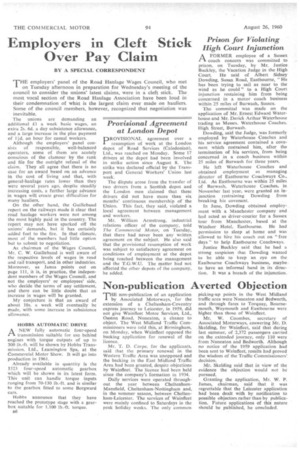Employers in Cleft Stick Over Pay Claim
Page 40

If you've noticed an error in this article please click here to report it so we can fix it.
BY A SPECIAL CORRESPONDENT THE employers panel of the Road Haulage Wages Council, who met on Tuesday afternoon in preparation for Wednesday's meeting of the council to consider the unions' latest claims, were in a cleft stick. The most vocal section of the Road Haulage Association have been loud in their condemnation of what is the largest claim ever made on hauliers. Some of the council members, however, recognized that negotiation was inevitable. The unions are demanding an additional it a week basic wages, an extra 2s. 6d. a day subsistence allowance, and a large increase in the plus payment of I Id. an hour for casual workers,
Although the employers' panel consists of responsible, well-balanced operators, some of them are acutely conscious of the clamour by the rank and file for the outright refusal of the claim. They all agree that there is no case for an award based on an advance in the cost of living and that, with general-haulage rates lower than they were several years ago, despite steadily increasing costs, a further large advance in wages will create great difficulties for many hauliers.
On the other hand, the Guilleband report on the railways made it clear that road haulage workers were not among the most highly paid in the country. The report may not have sparked off the unions' demands, but it has certainly added fuel to the fire. In that climate, most of the members had little option but to submit to negotiation.
As chairman of the Wages Council, Mr. C. W. Guillebaud is well aware of the respective levels of wages in road and rail transport, and in other industries. Moreover, as Janus points out on page 114, it is, in practice, the independent members of the Wages Council, and not the employers' or employees' side, who decide the terms of any settlement, and there can be little doubt that an increase in wages will be granted.
My conjecture is that an award of about 10s. a week will eventually be made, with some increase in subsistence allowance.
HOBBS AUTOMATIC DRIVE
1-3. A NEW fully automatic four-speed
transmission suitable for use behind engines with torque outputs of up to 300 lb.-ft. will he shown by Hobbs Transmission, Ltd., Leamington Spa, at the Commercial Motor Show. It will go into production in 1961.
Already available in quantity is the 1523 four-speed automatic gearbox which will be shown in its latest form. This unit can handle torque inputs ranging from 70-130 lb.-ft. and is similar to the gearbox fitted to some Borgward cars.
Hobbs announce that they have reached the prototype stage with a gearbox suitable for 1,100 lb.-ft. torque.
n6
Provisional Agreement at London Depot
PROVISIONAL agreement over a resumption of work at the London depot of Road Services (Caledonian), Ltd., was reached on Monday. Some 17 drivers at the depot had been involved in strike action since August 8. The strike was declared official by the Transport and General Workers' Union last week.
The dispute arose from the transfer of two drivers from a Scottish depot and the London men claimed that these drivers did not have more than six months' continuous membership of the Union. This fact, they said, violated a local agreement between management and workers.
Mr. William Armstrong, industrial relations officer of the company, told The Commercial Motor, on Tuesday, that there had never been any written agreement on the subject. He also said that the provisional resumption of work was subject to satisfactory agreement on conditions of employment at the depot being reached between the management and the T.G.W.U. The matter had not affected the other depots of the company, he added.
Prison for Violating High Court Injunction
PIA FORMER employee of a Sussex coach concern was committed to prison, on Tuesday, by Mr. Justice Buckley, the Vacation Judge in the High Court. He said of Albert Sidney Dowding, Susan Road, Eastbourne, "He has been trying to sail as near to the wind as he could" to a High Court injunction restaining him from being concerned in a motor coach business within 25 miles of Burwash, Sussex.
The committal was made on the application of Mr. Ernest Edward Waterhouse and Mr. Deriek Arthur Waterhouse trading as Messrs. Waterhouse Coaches, High Street, Burwash.
Dowding, said the Judge, was formerly employed by Waterhouse Coaches and his service agreement contained a covenant which restrained him, after the termination of his services, from being concerned in a coach business within 25 miles of Burwash for three years.
He left Waterhouse Coaches and obtained employment as managing director of Eastbourne Coachways Co., Ltd. As Eastbourne was within 25 miles of Burwash, Waterhouse Coaches, in November last year, were granted an injunction restraining Dowding from breaking his covenant.
in June, Dowding obtained employment with a Manchester company and had acted as driver-courier for a Sussex tour from Manchester, based at the Windsor Hotel, Eastbourne. He had permission to sleep at home and was allowed to hire his coach out on "free days" to help Eastbourne Coachways.
Justice Buckley said that he had a strong suspicion that Dowding wanted to be able to keep an eye on the Eastbourne Coachways business, maybe to have an informal hand in its direction. It was a breach of the injunction.




















































































































